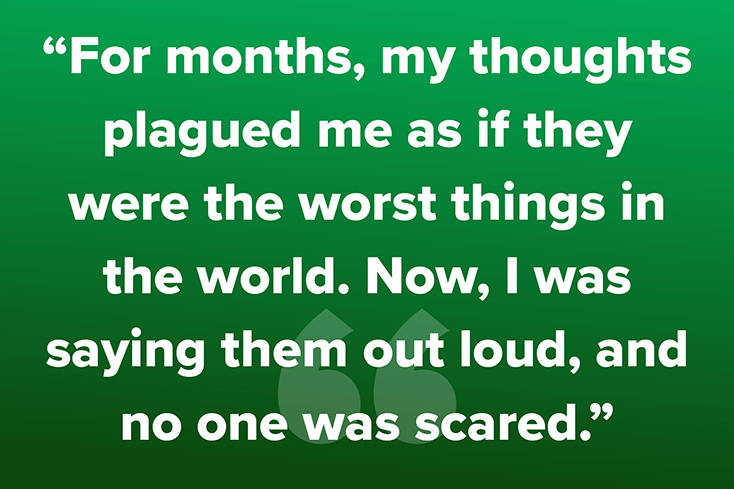
My life in 2020 was different, for obvious reasons. And for not-so-obvious reasons. It was the perfect storm of life changes: moving in with my partner, entering lockdown, quitting my job, starting a business, having the activities and family I love out of reach — and, of course, weathering the constant, depressing pandemic news. My stress mounted, spilling out of me in teary meltdowns and catastrophic thinking. I was lost, with little hope left.
Then came the intrusive thoughts. Horrifying thoughts. They seemed to come out of nowhere, but they stuck. There was a swarm of them, a cocktail of statements that became my personal brand of torture. My core values — loyalty, kindness, love — each became a target for arrows sharpened by my intrusive thoughts, my mind the bow that released them. The frequency and intensity of them had me second guessing my sanity and my worth. Everything grew darker.
The hardest part was facing people I loved and addressing my intrusive thoughts concerning them. The kinder my loved ones were to me, not knowing what was going on, the harder I fell. The guilt and shame were debilitating. “I need help,” I cried. And cried, and cried, and cried.
I clawed my way through the process of finding a therapist. Given the circumstances of 2020, therapists were limited, but I kept searching, determined. Describing my experience over email and on the phone made me cringe. Oftentimes, I only relayed half-truths about my thoughts, hating to hear myself say them out loud, as if the universe would hear and say, “Whoa, watch out for that girl.”
In my search, I fell deeper into depression, anger, withdrawal. I wanted to run away, to be alone. I pictured myself sitting in the corner of an empty, dimly lit room, a place where my brain would run out of material to craft intrusive thoughts. I wanted out, which bred intrusive thoughts about self-harm and suicide.
Then, I found someone: the third therapist was the charm. I spilled my anguish to her in the first session. She listened and nodded, as if this all made perfect sense. This was new for me. For months, my thoughts plagued me as if they were the worst things in the world. Now, I was saying them out loud, and no one was scared. Not scared of me, not scared of what I might do. She stuck with me.
Bit by bit, I peeled away the glue that bound my sense of self with these thoughts. But it took me some time to accept why this all happened to me. It had a name: OCD. I wasn’t so sure. “Really, OCD? I don’t think I meet the criteria…I mean, I don’t want to claim that and contribute to society’s misuse of ‘Oh, that’s just my OCD’…I need to be sure.” In short, I was having OCD thoughts about having OCD. We worked through it.
I faced my OCD brain head-on. I likened it to a glitch that flips my values into their antitheses, like opposite sides of a record: Side A blasts my intrusive thoughts’ top hits while Side B spins silently, my core values going unheard. Through therapy, I was able to hear side B again.
It’s difficult to sum up those months of debilitating sadness and uncertainty, convinced this was my new life — tormented and betrayed by my own mind. Yet the words I found through my struggle and recovery are simple: hope lost, strength found.
I can’t say it’s over. My intrusive thoughts haven’t gone away. I can still recount each one in intricate detail. But they don’t take me down anymore. I don’t know how my OCD brain will affect me in the future, but as of now, I can say that I am empowered to live with it. And that is reason to believe in stronger days ahead.

